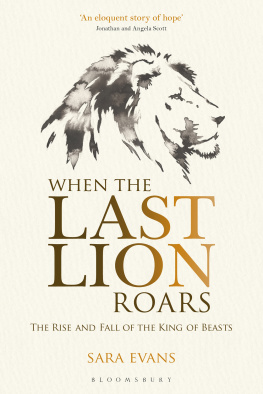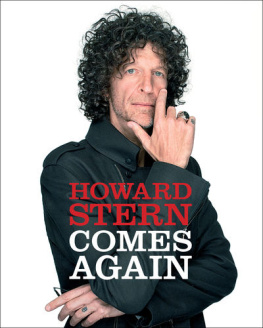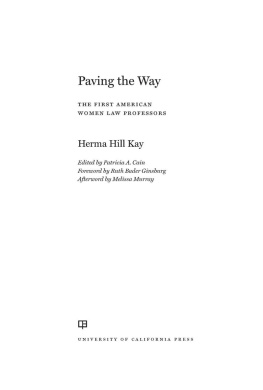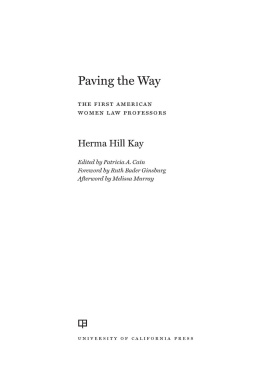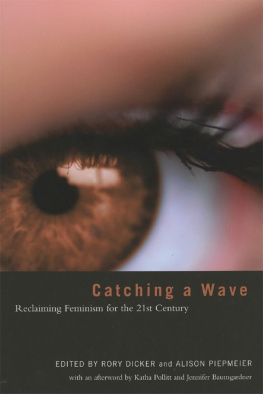
Also by Sara M. Evans
Personal Politics
Born For Liberty
TIDAL WAVE
HOW WOMEN CHANGED
AMERICA AT CENTURYS END
SARA M. EVANS
FREE PRESS
NEW YORK LONDON TORONTO SYDNEY

FREE PRESS
A Division of Simon & Schuster, Inc.
1230 Avenue of the Americas
New York, NY 10020
www.SimonandSchuster.com
Copyright 2003 by Sara M. Evans
First Free Press paperback edition 2004
All rights reserved, including the right of reproduction
in whole or in part in any form.
The Cure at Troy: A Version of Sophocles Philoctetes. Noonday Press, 1991,
reprinted by permission.
FREE PRESS and colophon are trademarks
of Simon & Schuster, Inc.
Manufactured in the United States of America
1 3 5 7 9 10 8 6 4 2
Library of Congress Cataloging-in-Publication Data
Evans, Sara M. (Sara Margaret).
Tidal wave: the story of the modern womens movement and how it
continues to change America / Sara M. Evans
p. cm
Includes biblioographical references and index.
1. WomenUnited StatesHistory
2. FeminismUnited StatesHistory
HQ 1426 E938 2003
305.42/0973 21 2002033926
ISBN: 0-02-909912-9
0-7432-5502-X (Pbk)
eISBN-13: 978-1-4391-3553-2
ISBN-13: 978-0-7432-5502-8
For information regarding special discounts for bulk purchases,
please contact Simon & Schuster Special Sales at 1-800-456-6798
or business@simonandschuster.com
TO ELAINE TYLER MAY,
RIV-ELLEN PRELL,
AND
THE MANY WOMEN
WHO HAVE TAUGHT ME JUST HOW
POWERFUL SISTERHOOD CAN BE.
ACKNOWLEDGMENTS
MANY FRIENDS AND COLLEAGUES have aided me in the years I worked on Tidal Wave, and I must apologize in advance in the sure conviction that I will not remember all of them. My initial editor, Joyce Seltzer, first hatched the idea with me and helped to frame my thinking as I started into the project a decade ago. Even after she left Free Press, she cheered my work from the sidelines and I have always appreciated her wisdom, enthusiasm, and friendship.
Since the early years of off and on work on this project, I have had the good fortune to enjoy the assistance of current and former graduate students at the University of Minnesota. They not only gathered materials but also challenged me intellectually and made this a better book. I am extremely grateful to Katherine Meerse, Chris Sharpe, Mari Trine, Beth Salerno, Josephine Fowler, Mike Lansing, and Sharon Leon. The time to do this work and the ability to hire assistants were made possible by grants from the Graduate School at the University of Minnesota, the McKnight Foundation, and the Rockefeller Foundations Bellagio Study and Conference Center.
The critical feedback of colleagues has also been invaluable. From early papers presented at the University of Minnesota workshop on comparative womens history and Center for Advanced Feminist Studies to a round-table at the Berkshire Conference on Womens history I have received thoughtful and provocative responses. I owe more than I can say to many groups of friends and colleagues who have listened, read, and encouraged both directly and indirectly: These include Group 22, the Serendipity group, the Comparative Womens History Workshop, my Re-Imagining small group, participants in sessions at professional meetings, and the many campus and community groups who allowed me to try out ideas in their early stages. Cheri Register and Charlotte Bunch read chapter drafts and responded to ideas in their early form. Linda Gordon, Rosalind Baxandall, Elaine Tyler May, Riv-Ellen Prell, Sally Kenney, Barbara Welke, Chuck Dayton, and Josephine Fowler read the complete (or nearly complete) manuscript. Their feedback sharpened and clarified my thinking. For editorial clarification I am especially grateful to Bruce Nichols, my editor at The Free Press, and to Chuck Dayton. Chucks poetic sensibility, in particular, made this a better book. The flaws that remain are altogether my responsibility.
Tidal Wave is about the power of sisterhood, and I have experienced that power in my own life. I dedicate this book to two of these sister-friends, Elaine Tyler May and Riv-Ellen Prell, who have been a continual source of both intellectual and personal support for more than a quarter century. Their friendship across the decades is an incalculable gift, and they stand in for the many others I would love to name.
My family has also been a constant source of sustenance. My parents, my brothers and sisters-in-law, and my children have supported my work over the years and also provided me with a context that keeps my priorities clear. My husband, Chuck Dayton, is the light of my life. This book was nearing completion when he showed up, but his support has been crucial. Now I look forward to the next phase of our adventurous life together.
Sara M. Evans
July 2002
CONTENTS
Chapter One
The Way We Were; The Way We Are
Chapter Two
Personal Politics
Chapter Three
The Golden Years
Chapter Four
Undertow
Chapter Five
Crest
Chapter Six
Deep Currents
Chapter Seven
Resurgence
History says, Dont hope
On this side of the grave.
But then, once in a lifetime
The longed-for tidal wave
Of justice can rise up,
And hope and history rhyme.
Seamus Heaney, from The Cure at Troy
TIDAL WAVE
CHAPTER 1
The Way We Were;
The Way We Are
THE FIRST WAVE of womens rights activism in the United States built slowly from its beginnings in the middle of the nineteenth century, finally cresting in 1920 with the passage of the nineteenth Amendment to the U.S. Constitution guaranteeing women the most fundamental right of citizenship, the vote. It swelled slowly and steadily, riding this single, symbolic issue. By contrast, a secoud wave of womens rights activism in the last half of the century arose almost instantly in a fast-moving and unruly storm, massive from the very outset. This driving storm, with shifting winds and crosscurrents, never focused on a single issue and sometimes seemed to be at war as much within itself as with patriarchy. Yet that storm, with all its internal conflicts, produced a tidal wave of feminism that washed over the United States and changed it forever.
It is startling to realize that in the early 1960s married women could not borrow money in their own names, professional and graduate schools regularly imposed quotas of 5-10 percent or even less on the numbers of women they would admit, union contracts frequently had separate seniority lists for women and men, and sexual harassment did not exist as a legal concept. It was perfectly legal to pay women and men differently for exactly the same job and to advertise jobs separately: Help WantedMen and Help WantedWomen.
Feminism, the broad banner under which the second wave named itself, not only shattered a set of legal structures that upheld inequalities between women and men but also challenged prevailing commonsense everyday practices built on the assumption that women were naturally docile, domestic, and subordinate. Should a corporate secretary also be an office wife who serves coffee and buys birthday presents for the bosss wife? Should etiquette demand that men hold open doors for women but not the reverse? Must women change their names upon marriage? Can men tolerate having a female boss? Can women operate heavy machinery or wield surgical knives with meticulous precision? Must women always be the ones to make and serve coffee? Would successful businessmen take legal advice from female lawyers? Can language accommodate the possibility that firemen, policemen, and chairmen might, in fact, be women? Are womens incomes, in fact, secondary? Is a woman working outside the home by definition a bad mother? Is a man whose income cannot support his family by definition a failure at manhood? Can rape occur within a marriage?
Next page

